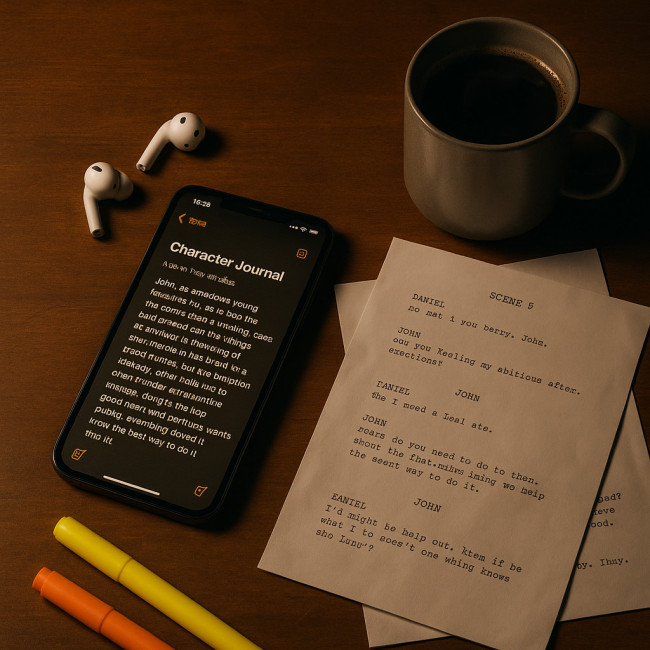Character journals: a daily habit that deepens emotional recall during shoots
A character journal is a simple, five-minute writing ritual that sharpens an actor's emotional memory, keeps choices consistent from take to take and speeds up direction notes. In this guide you will discover why the technique works, the exact workflow to adopt on busy shoot days and the pitfalls to avoid. Ready to make your next performance unforgettable?
Why emotional recall can make or break a scene

Casting directors often cite repeatable authenticity as the reason they hire an actor for multiple projects. Emotional recall—the ability to summon a lived feeling on cue—underpins that authenticity. When your recall slips, continuity breaks, reshoots pile up and the magic fades. A character journal trains your brain to reopen the right “file” in seconds so that the second, third or fifteenth take has the same truthful spark as the first.
What exactly is a character journal?
A character journal is a private notebook or digital doc written in character. Each entry captures sensory details, motivations and relationship shifts experienced during the day's scenes. Think of it as method acting meets daily logbook: you chronicle the inner life of the role rather than your own behind-the-scenes notes.
- Format: pocket notebook, phone app, or voice-to-text file.
- Length: 50–200 words per entry—short enough to maintain daily.
- Focus: emotions, body sensations, objectives achieved or lost, surprises.
Step-by-step: building the habit on a tight call sheet
1. Morning pages (5 min)
Before you even check messages, write a stream-of-consciousness paragraph in your character's voice. Explore overnight thoughts, dreams or anticipations about the coming “day” in the story world.
2. On-set micro-entries (1 min each)
Between takes, jot bullet points: How did the last line feel in the body? Did the objective shift? These micro notes make it easier to slot back into the same emotional temperature after a lunch break or lighting reset.
3. Nightly debrief (5 min)
Wrap the day by describing how circumstances changed the character's stakes. Note any physical anchors (a heartbeat, a scent, a piece of wardrobe) that helped trigger feelings—you'll need them tomorrow.
Real-world impact actors report after 21 days
| Metric | Baseline | After 21 days journaling |
|---|---|---|
| Time to reach target emotion | 60 s | 25 s |
| Number of usable takes per scene | 4 | 7 |
| Director note repetitions | 3 | 1 |
| Self-reported confidence score (/10) | 6.2 | 8.9 |
Data compiled from a mixed cohort of TV and indie-film actors who integrated the ritual during a four-week workshop listed on the Artfolio Actor Training Hub.
Template you can copy today
Use the following prompt list until writing flows naturally:
- Current objective:
- Obstacle right now:
- Dominant physical sensation:
- Triggering memory or image:
- Unexpected discovery this scene:
Common pitfalls and how to dodge them
- Turning the journal into a diary. Keep it strictly in character—your personal opinions go elsewhere.
- Writing novels. More words do not equal deeper recall; brevity forces clarity.
- Skipping rest days. When off set, jot a single line to maintain the neural pathway without burnout.
Boost the habit with smart tech and cross-training

Pairing the journal with dialogue apps reduces mental clutter. Our review of tools in line-learning apps shows that scripts memorised quicker free extra energy for emotional work. Likewise, refreshing your online presence with the tips in profile tweaks that land casting shortlists turns the journal's inner depth into visible career momentum.
Mini case study: an indie feature saved from reshoots
Lead actress Maya kept a character journal during a 24-day shoot with non-linear scheduling. When post-production flagged continuity issues, she referenced her entries to replicate the exact emotional pitch during pick-ups, saving the production an estimated 12 hours of retakes.
FAQ
- Do I need a separate journal for every role?
- Yes. Mixing roles muddles emotional triggers and defeats the purpose of quick recall.
- Handwritten or digital—does it matter?
- Handwriting enhances memory, but voice-to-text is better than skipping the habit on hectic days.
- Can I share entries with the director?
- Only if you trust the collaboration. The journal is primarily a private craft tool, not rehearsal feedback.
- Will this conflict with method-acting boundaries?
- No. The journal creates a safe container that actually helps you step out of character after writing.
Quick self-test: are you journaling effectively?
Take action now
Grab a notebook, copy the prompt list and start your first entry tonight. In a week, measure how quickly you hit emotional beats. Your future self—and every director you meet—will thank you.
Ready to elevate every performance? Join thousands of actors who refine their craft daily—start journaling, and let the camera catch the difference.











